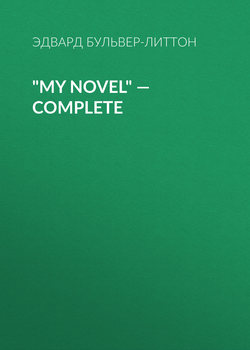Читать книгу "My Novel" — Complete - Эдвард Джордж Бульвер-Литтон, Эдвард Бульвер-Литтон - Страница 69
BOOK FOURTH CHAPTER XV
ОглавлениеUnconscious of the change in his fate which the diplomacy of the parson sought to effect, Leonard Fairfield was enjoying the first virgin sweetness of fame; for the principal town in his neighbourhood had followed the then growing fashion of the age, and set up a Mechanics’ Institute, and some worthy persons interested in the formation of that provincial Athenaeum had offered a prize for the best Essay on the Diffusion of Knowledge,—a very trite subject, on which persons seem to think they can never say too much, and on which there is, nevertheless, a great deal yet to be said. This prize Leonard Fairfield had recently won. His Essay had been publicly complimented by a full meeting of the Institute; it had been printed at the expense of the Society, and had been rewarded by a silver medal,—delineative of Apollo crowning Merit (poor Merit had not a rag to his back; but Merit, left only to the care of Apollo, never is too good a customer to the tailor!) And the County Gazette had declared that Britain had produced another prodigy in the person of Dr. Riccabocca’s self-educated gardener.
Attention was now directed to Leonard’s mechanical contrivances. The squire, ever eagerly bent on improvements, had brought an engineer to inspect the lad’s system of irrigation, and the engineer had been greatly struck by the simple means by which a very considerable technical difficulty had been overcome. The neighbouring farmers now called Leonard “Mr. Fairfield,” and invited him on equal terms to their houses. Mr. Stirn had met him on the high road, touched his hat, and hoped that “he bore no malice.” All this, I say, was the first sweetness of fame; and if Leonard Fairfield comes to be a great man, he will never find such sweets in the after fruit. It was this success which had determined the parson on the step which he had just taken, and which he had long before anxiously meditated. For, during the last year or so, he had renewed his old intimacy with the widow and the boy; and he had noticed, with great hope and great fear, the rapid growth of an intellect, which now stood out from the lowly circumstances that surrounded it in bold and unharmonizing relief.
It was the evening after his return home that the parson strolled up to the Casino. He put Leonard Fairfield’s Prize Essay in his pocket; for he felt that he could not let the young man go forth into the world without a preparatory lecture, and he intended to scourge poor Merit with the very laurel wreath which it had received from Apollo. But in this he wanted Riccabocca’s assistance; or rather he feared that, if he did not get the philosopher on his side, the philosopher might undo all the work of the parson.
